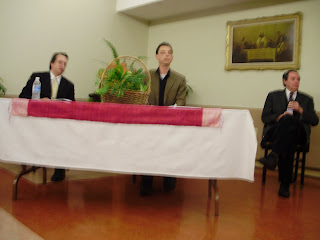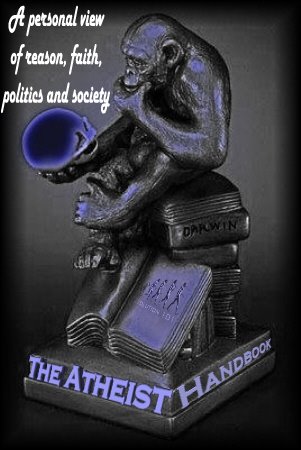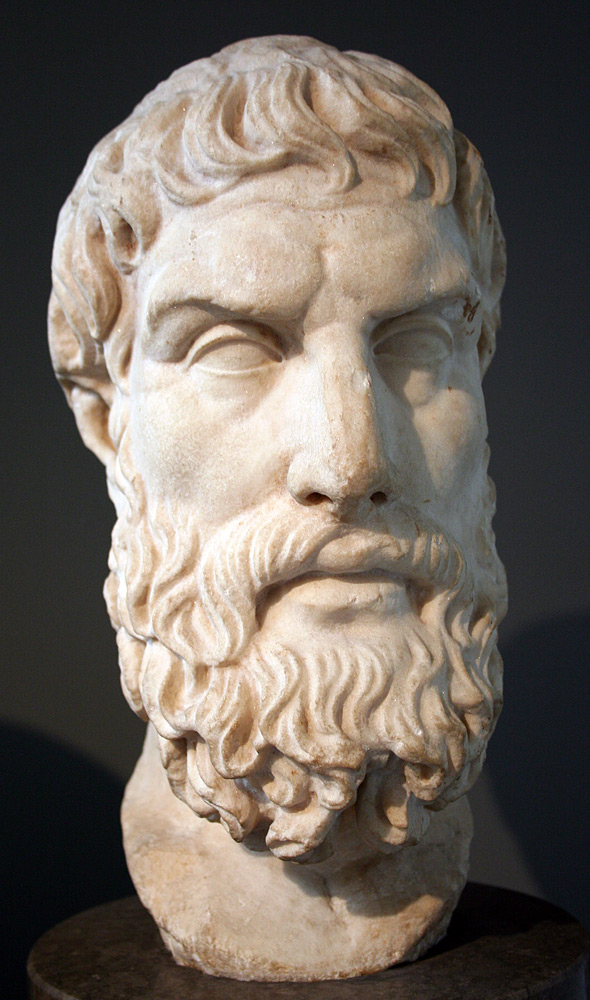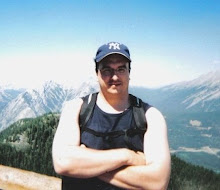 On Nov. 25 in Fonthill's St. Alexander's Church I debated Catholic Brock University professor David Goicoeecha on the existence, nature and meaning of the afterlife. We were very fortunate to have Justin Trottier from the Centre for Inquiry moderating the debate and he did an excellent job. It was a lively event, and fairly well attended. I will post my own recap later, but if you want an overview of the night check out Justin's blog here: http://www.equalismactivism.com/?p=2151
On Nov. 25 in Fonthill's St. Alexander's Church I debated Catholic Brock University professor David Goicoeecha on the existence, nature and meaning of the afterlife. We were very fortunate to have Justin Trottier from the Centre for Inquiry moderating the debate and he did an excellent job. It was a lively event, and fairly well attended. I will post my own recap later, but if you want an overview of the night check out Justin's blog here: http://www.equalismactivism.com/?p=2151In Part 1, I posted my opening remarks. The following are David's opening remarks:
I. INTRODUCTION
Dear Grant,
As we debate Secular Humanism verses Catholicism I will address my written
 material to you in the form of a letter. I will make the same points here that I will bring out when you and I debate this issue in spoken form in the public forum. According to the Catholic faith the church is the continuation of the Body of Christ. So the great gift of the church was given to us when the God-man stepped down from his omnipotence and became flesh. This is the gift of Incarnational Love that came “That all flesh might see the salvation of God.” (Luke 3:6)
material to you in the form of a letter. I will make the same points here that I will bring out when you and I debate this issue in spoken form in the public forum. According to the Catholic faith the church is the continuation of the Body of Christ. So the great gift of the church was given to us when the God-man stepped down from his omnipotence and became flesh. This is the gift of Incarnational Love that came “That all flesh might see the salvation of God.” (Luke 3:6)Jesus instituted his church when he said to Peter: “Thou art Peter and upon this rock I will build my church and the gates of hell will not prevail against it. ” (Matt. 16:18) It was Paul who stressed that the church is the Body of Christ and that we are all members of his body interrelated to each other so that the eye cannot say to the hand I do not need you. It has been said that outside the church there is no salvation. But all who love and do good have baptism of desire so all belong to the church and each person in his or her uniqueness will live forever. This eternal life of every creature is humankind’s highest affirmation. Thus, Grant, as we begin our conversation together I thank you for agreeing to begin with eschatology or the theory and practise of life after death. That Holy Mother Church is God’s greatest gift since creation can be appreciated from many aspects as our debate will show. But that we might all live happily in love forever is I think the best way to begin appreciating the one, holy, catholic and apostolic church. Her belief in the eternal salvation for each is I will argue humankind’s highest affirmation as Nietzsche showed.
II. BODY
Grant, in order to explain the church’s view about the salvation of all in an eternal joy or love with God who is the love between the Father, the Son and the Holy Spirit I will quote and explain 8 key passages about being saved by the God of Love from His Holiness, Benedict XVI’s book on Eschatology. The Catholic prays for the blessed dead and asks the blessed dead to pray for us. At the end of the Apostle’s Creed we say:
I believe in the Holy Spirit
In the holy Catholic Church
In the communion of saints
In the forgiveness of sins
and in life everlasting. Amen.
Thus the Catholic lives in the shamanic world of living with the spirits of our loved ones who have died. The Catholic sees all the dead as living and loving and overcoming their many hurt relations through purgatory or an intermediate state until the final resurrection at the end of the world.
(1) At the end of part one of his Eschatology Ratzinger writes that hope for all exists only where there is sheer love. He says:
Man with his ambiguous story of acceptance and rejection of grace is an acting subject in God’s saving plan, and it is on this basis that he inhabits time. He is an true subject in his own right, but not as one who would produce the Kingdom of God from his own resources. The “right” in which he is a subject he receives from the “Thou” of God. He possesses genuine subjecthood only because he has become a son. Divinization “emancipation” as a sharer in the Kingdom of God, is not a product but a gift. Sheer love can only be so. It is because entry into the Kingdom comes about through love that the Kingdom is hope. In a laboratory – which is how Ernest Bloch defined the world – there is nothing to hope for. Hope exists only where there is love. Since, in the crucified Christ, love prevailed and death fled vanquished, human hope can truly “spring eternal.” p. 66
And so Grant, we remember Pascal’s wager:
I can live my life as a wager
that there is a God or there is not a God.
If I am an atheist and win I win nothing.
If I am a theist and win I win everything.
If I am a theist and lose I lose nothing.
If I am an atheist and lose I lose everything.
Ratzinger does not say the atheist will lose everything. He says that in so far as the atheist loves and is loved he too will win all. Perhaps some people decided to become atheists because they thought like Pascal and were offended by the idea of a rewarder-punisher God who would exclude some from eternal bliss.
I Grant prefer to be on the God of Love and to live as loving a life as I can and I see prayer as a way of loving and being loved.
(2) Grant, Ratzinger goes on to further clarify the idea of eternal love for all by locating it in scripture and tradition. He writes;
In the light of these insights, it should be evident that the Bible did not turn a particular anthropology into dogma. Rather did it offer the Christology which flows from the resurrection as the one foundation for eschatology truly appropriate to faith. This foundation confers on thought the right and duty to draw on its own potential in order to illuminate the anthropological presuppositions and implications contained in the foundation itself. Starting out from this perception, the patristic age haltingly and the Middle Ages more self confidently used the instruments provided by Greek thinkers so as to grasp the meaning of the statement that we will not be stored up after death in caves and chambers like chattels, but clasped by that person whose love embraces us all. (p. 130)
(3) So Grant, four of the great questions we will be debating are: (1) why is there something rather than nothing? (2) Is there a God? (3) Are we free? and (4) Are we immortal? We are beginning with the last question first because humankind has dealt with death and the spirit world in all of its art since earliest shamanic times. After looking at life after death in scripture and tradition in general Ratzinger focuses on The Resurrection. He argues that given texts like I Cor. 15:20-28 the whole of creation will be saved. He writes:
That the resurrection state is quite different from our present conditions of life is resoundingly affirmed. What, in more actual terms, such anti-spiritualistic pneumatic realism may mean is less immediately obvious. And yet the claim that the whole of God’s creation, in whatever form, will enter upon its definitive salvation at the end of time is so palpable that any reflective systematization of the biblical data must do it justice… The early Western creed does not speak of ‘the resurrection of the dead’ but of the ‘resurrection of the flesh’… Thanks to its Jewish roots, this phrase indicates the salvation of the human creature, or of creation, in its entirety. p. 172.
(4) Continuing on Grant with Holy Mother Church’s teaching of a love for all that will save all Ratzinger relates this to the compassion of the Bodhi Sattva in Mahayana Buddhism. He writes;
The nature of love is always to be “for” someone. Love cannot, then, close itself against others or be without them so long as time, and with it suffering, is real. No one has formulated this insight more finely that Thérèse of Lisieux with here idea of heaven as the showering down of love towards all. But even in ordinary human terms we can say, How could a mother be completely and unreservedly happy so long as one of her children is suffering? And here we can point once again to Buddhism with its idea of the Bodhisattva who refuses to enter Nirvana so long as one human being remains in hell. p. 188
(5) Grant, our love for others has a natural longing for eternity. When we say: “I love you.” there is always in parenthesis after it: “forever”. Thus Ratzinger writes:
The fullness of salvation is not yet realized so long as that salvation is only certain by anticipation in God, falling short of even so much as one person who still suffers… Every human being exists in himself and outside himself: everyone exists simultaneously in other people. What happens in one individual has an effect upon the whole of humanity, and what happens in humanity happens in the individual. p. 190.
Grant, as members of the Body of Christ no man is an island. We are all part of the main. This Body of Christ which is Holy Mother Church will not be content until every creature is lovingly saved for ever in a paradise of growing love for each other. As love matures especially through prayer for all, it believes more and more that our love will be forever.
(6) Grant in the ancient Apostle’s Creed it is said that Christ will come to judge the living and the dead. It may seem that he will condemn some to hell and reward some with heaven. But Ratzinger shows how scripture and tradition teach that all will be judged as good. Ratzinger writes:
In death a human being emerges into the light of full reality and truth. He takes up that place which is truly his by right. The masquerade of living with its constant retreat behind posturings and fictions is now over. Man is what he is in truth. Judgment consists in this removal of the mask of death. The judgment is simply the manifestation of the truth. Not that this truth is something impersonal. God is truth; the truth is God; it is personal… Herein lies that redemptive transformation of the idea of judgment which Christian faith brought about. The truth which judges man has set out to save him. It has created a new truth for man. In love it has taken man’s place and, in this vicarious action, has given man a truth of a special kind, the truth of being loved by truth. p. 206
And so Grant, Eschatology is concerned with the four last things: death, judgment, heaven and hell. His holiness is here telling us that judgment is so loving that all flesh will be saved. There is no hell. This is what Nietzsche calls humankind’s highest affirmation. The affirmation of a Yes and Amen for the external return of all existence.
(7) Grant, the next big point that Ratzinger makes about the love of Holy Mother Church for all of has has to do with the nature of our personhood. The church teaches that all persons are of equal worth, they are all interpersonal and each is unique. Because all are members of the church whether they know it or not we all depend on each other. As Ratzinger puts it:
We are ourselves only as being in others, with others and through others. Whether others curse us or bless us, forgive us and turn our guilt into love – this is all part of our destiny. The fact that the saints will judge means that encounter with Christ is encounter with his whole body. I come face to face with my own guilt vis-à-vis the suffering members of that body as well as with the forgiving love which the body derives from Christ its head…As Charles Péguy so beautifully put it: “I hope in you for me.”
So Grant, my guilt can hurt many, many others. My sins of commission and omission can bring much suffering to my closest loved ones and even to many members of Holy Mother Church I do not know. Likewise my love and prayer can bless and heal others. Ratzinger goes on to make a second point here. He writes:
Self-substituting love is a central Christian reality, and the doctrine of purgatory states that for such love the limit of death does not exist… II Maccabees 12:42-45 first makes this clear. This original “given” has never been in dispute between East and West. It was the Reformation which called it into question, and that in the face of what were in part objectionable and deformed practices.
Holy Mother Church teaches us to pray for the blessed dead and each little prayer can be a blessing for them. We also can ask them to pray for and thus build up our love in a continuing way with each other.
Grant, as Ratzinger comes to the end of his book on life after death he related a loving eternity for all of us to his concept of soul. He writes:
What gives rise to man’s longing for survival? Not the isolated I, but the experience of love. Love wills eternity for the beloved and therefore for itself. Immortality does not inhere in a human being but rests on a relation…“The soul” is our term for that in us which offers a foothold for this relation. Soul is nothing other than man’s capacity for relatedness with truth, and with love eternal, and in this way, we can get right the real order of priorities: the truth and love that we call “God” give man eternity, and because in the spirit and soul of man matter is integrated, matter attains in him to the fulfilled completeness of the resurrection. p. 259
So Grant, after we die Catholics believe that there will be two stages to our immortality. First, there will be the intermediate state of purgatory when we are all communally being healed from our lack of love. Then, at the end of this world there will be the resurrection of our flesh so that we will all love in glorious form with the Resurrected Christ.
III. CONCLUSION
So Grant, I have used many long quotations from Pope Benedict XVI to show that I am not just making up this greatest love story ever told. Ratzinger even quotes Nietzsche that “All joy will eternity, wills deep, deep eternity” and he continues “that there are some moments that should never pass away” (p. 94). Holy Mother Church is the Body of Christ and every fleshly member, it is believed, will live forever. This is why I argue that the Catholic Church which in its universality includes all flesh is the second greatest gift God has given us since creation.
Last year when I debated Horst Klaus he talked about an humanistic love. I like that. Whenever we love I think it is a moment that should never pass away. This is why I love Holy Mother Church who has given so much to me because she teaches that every loving creature in every loving moment will not only last forever but continue to grow in that love forever.
As I have studied various philosophies and various religions I have not found another that affirms so much. Therefore, I choose to be a Catholic so that I can love all persons even of other faiths forever.
















No comments:
Post a Comment